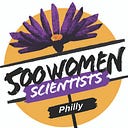Updating the City of Philadelphia’s Climate Goals
To the city of Philadelphia Office of Sustainability and city leaders:
We are writing on behalf of the 500 Women Scientists Philly Pod, a grassroots, volunteer-based organization working to serve society by making science open, inclusive, and accessible. Our advocacy director JoEllen McBride, on behalf of our pod, signed on to a letter describing Proposed Considerations for Comprehensive PGW Study/Studies last winter.
We are grateful for all that the Office of Sustainability is doing to promote changes in Philadelphia that reduce greenhouse gas emissions, including first steps toward diversifying PGW to begin moving away from a business model reliant on fossil fuels. However, we have a concern that the related RFP, along with the City’s emissions reductions goals — to reduce emissions 80% by 2050, and to align with the Paris Agreement — do not accurately reflect the current science of climate change. We are writing to urge ambition both in the timeline and end goal of the City’s climate commitment.
We call on the City of Philadelphia and Office of Sustainability to go further than currently described and plan for the eventual goal of net-zero emissions. In line with this goal, we ask for the PGW diversification study to address options for becoming a net-zero emissions utility. Ideally, as stated in the Clean Energy Vision (CEV), emissions reductions should happen faster than 80% by 2050. But to be consistent with the Paris Agreement and the IPCC path to maintain 2 degrees C or less of global warming, it is clear that we must reach net-zero emissions. To limit warming to 1.5 degrees C, carbon dioxide emissions should reach net-zero globally on average by 2050–2052, with an implication that developed countries decarbonize sooner. Further, a growing body of research released since the last IPCC report suggests that deforestation, clouds, and other carbon cycle feedback loops may further accelerate warming, and that published predictions tend to underestimate the threat of climate change. All this suggests that while there may be no scientific consensus on the exact year that we must achieve net-zero emissions, goals other than net-zero emissions defy the reality of our carbon budget, and each year of delay reduces our ability to minimize global warming.
We also ask for a new Clean Energy Vision to include a transparent explanation for the 20% of emissions not currently addressed with the 80 by 50 goal. What are the difficulties with addressing those sources and what are possible strategies for doing so? Like the current CEV, the plan can highlight gaps in the City’s ability and what specific changes at other levels of government could fill those gaps. Philadelphia is home to a multitude of experts who can be called upon to address these challenges and in an equitable manner, including knowledgeable and engaged community stakeholders. Without a clear picture of these difficult sources of emissions, we allow them to persist and hamper efforts to imagine the transformations necessary to reach net-zero emissions. Such transparent statements by the City would provide the evidence needed to advocate for changes at other levels of government, and help build political will for stronger action within the City by more accurately communicating the urgency with which we need to act.
Philadelphia would join numerous cities, both nationally (Austin, Boston, San Francisco) and internationally (London, Manchester, Oslo, Vancouver), that aim to reach net-zero by 2050 or sooner, to protect their citizens and reduce the burden on those with fewer resources. These ambitious emissions reduction trajectories require a dramatic transformation of our city, infrastructure, and resource use. In light of both COVID-19 and climate challenges, cities around the world (Seattle, Barcelona, Athens, Bogota, Paris) are transitioning their city centers to be more people-centric, promoting social distancing and use of space currently allocated to cars for safer, cleaner, and more compact modes of transportation. Philadelphia’s own Strategic Transportation Plan, CONNECT, talks about the efficiency of non-car transportation, and how those modes also increase customer interactions with adjacent businesses. The pandemic, along with the recent closure of the PES refinery, one of the City’s largest sources of emissions, has shown us that behavioral and structural changes that can permanently reduce emissions are actually possible. We have a chance to reimagine the future of jobs, transportation, and neighborhoods in our city, in particular for communities that have disproportionately borne the economic, health, and environmental costs of our City’s dependence on fossil fuels.
We encourage comprehensive approaches to the problem and are eager to be part of and support ongoing conversations with you and other stakeholders in developing equitable and evidence-based solutions for our city. It is important to us at 500 Women Scientists that we use the best available science and practices to bolster the voices of those with the most at stake. We look forward to discussing this with your office in the near future.
500 Women Scientists, Philly Pod
